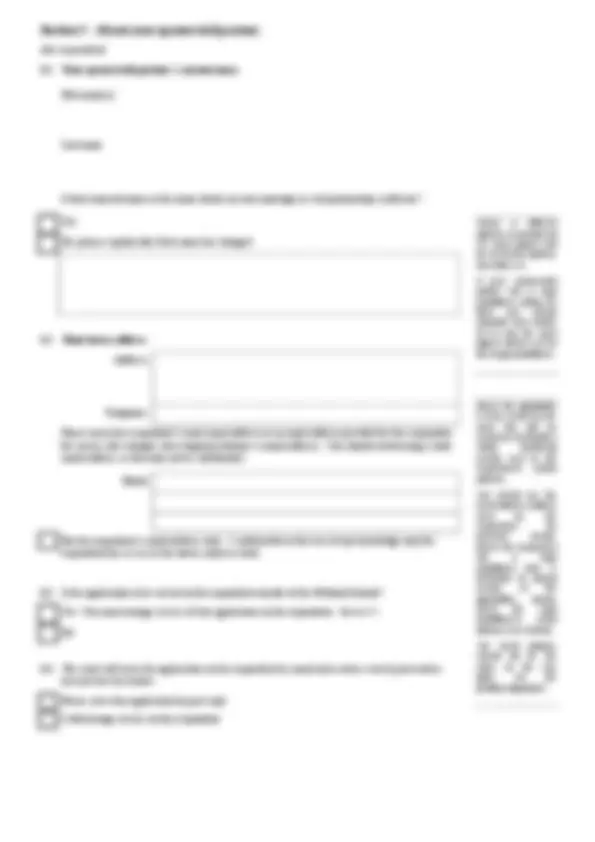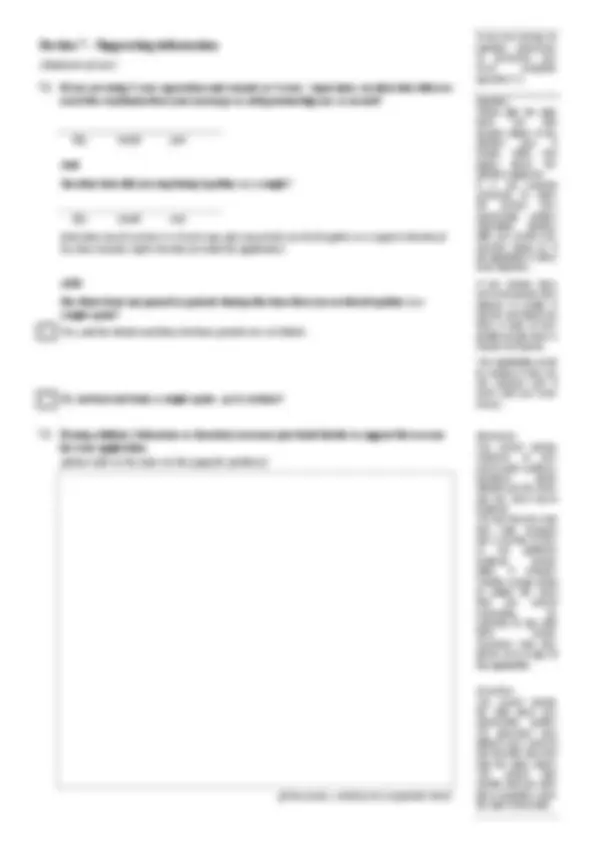Download Divorce or Dissolution Application in the Falkland Islands: Instructions and Requirements and more Lecture notes Acting in PDF only on Docsity!
D
Application for a divorce, dissolution or (judicial) separation
Case Reference: SC/CIV/ Always quote this reference
Date Issued:
You can only make an application for divorce or dissolution if you have been in your marriage or civil partnership for at least
one year. This does not apply to (judicial) separation applications.
The information you give will be used as evidence by the court to decide if you entitled to legally end your marriage or civil
partnership or to get a (judicial) separation order from your partner. A copy of this form will be sent to your spouse/civil partner
by the court.
If there are exceptional reasons why your application should be dealt with urgently then please set those reasons out in a
covering letter.
At times in this form you will be referred to as the Petitioner or Applicant and your spouse/civil partner will be referred to as the Respondent. These are technical terms used in law. For marriages/civil partnerships in the Falkland Islands you can request a copy of the certificate by emailing
registrargeneral
@townhall.gov.fk
You will need to pay a
fee.
If you entered into a religious marriage as well a civil marriage, these proceedings may not dissolve the religious part of your marriage. It is important that you contact the relevant religious authority and seek further guidance if you are unsure.
Section 1 - Your application
(known as a petition in divorce and judicial separation)
1.1 What application do you wish to make?
Divorce on the ground that the marriage has broken down irretrievably
Dissolution on the ground that the civil partnership has broken down irretrievably
(Judicial) separation
1.2 What documents are you supplying to support your application?
In cases of urgent applications it may be possible for you to make an application to allow you to
deliver the original or a certified copy of the marriage/civil partnership certificate to the court at a
later date.
Your marriage or civil partnership certificate or a certified copy of the certificate from where you
got married or entered into a civil partnership (a photocopy with not be accepted)
A translation that has been certified by a notary public or authenticated by a statement of truth by
the person who did the translation. This should be provided if your marriage or civil partnership
certificate (or similar document issued under the law in the country you registered your marriage
or civil partnership) is not in English.
This can be different to the one on your marriage certificate. This can be your last name, your spouse/ civil partner’s last name or a double barrelled last name that combines the two. If you have changed your name, other than through your marriage, since you got married you must attach a copy of your change of name deed or otherwise explain why your name has changed. If you do not wish to disclose your contact details to your souse/ civil partner you should leave those details black and complete Form C Confidential contact details. If you have a legal practitioner acting for you, the court will send all papers to their address. If you do not have a legal practitioner, the court will send papers to your home address. Remember a copy of this form will be sent to your spouse/civil partner. If you do not want them to know your current contact details you should not enter them here or provide any details in the form which may give them information on how to contact you.
Section 1 - About you
(the applicant/petitioner)
2.1 Your current name
First name(s)
Last name
Is this either your married name or the name shown on your marriage or civil partnership
certificate?
Yes
No, please attach your change of name deed/statutory declaration or if this is not applicable,
explain why your name has changed.
2.2 Confidentiality
Can your contact details be shared with your spouse/civil partner?
Yes
No, please complete the separate C8 form with your details in order to do this.
2.3 What is your home address?
If you want to keep your contact details confidential, do no complete this question. Please
complete form C8.
Address:
Telephone:
Email:
2.4 Do you have a legal practitioner acting for you?
No
Yes, please give their details below
2.5 Legal practitioner’s details
Name
Firm
Address
Telephone
Email
The court will send documents to this address.
3.5 Has the respondent provided a different address for the court documents to be sent to?
No
Yes, please use the address below
Legal Practitioner's name
(if applicable and if known)
Legal Practitioner's firm
(if applicable and if known)
Address:
Telephone:
Email:
If you are applying without your marriage/ civil partnership certificate you will need to make a separate application on Form D (Application notice). It is recommended that you seek legal advice if you unsure of how to do this.
Section 4 - Details of marriage/civil partnership
You should attach your marriage or civil partnership certificate to this application, together with a
certified translation in English is necessary (the court will keep your documents and not return them).
If you do not have the original certificate and cannot get a copy of it, you will have to make a separate
application, alongside this application, to issue this form without it.
4.1 Did you marriage take place outside of the Falkland Islands?
Yes
No
4.2 Are you making a separate application to use without your marriage or civil partnership
certificate?
Yes
No, please explain why their name has changed.
If you answered ‘Yes’, to either question 4.1 or 4.2 above, please give the place where the
marriage/civil partnership was formed, as it appears on your marriage/civil partnership certificate
(if any)
4.3 Date of marriage or civil partnership
(day) (month) (year)
4.4 Your full first name(s) and last name(s) - as shown on your certificate
Your spouse/civil partner’s full first name(s) and last name(s) - as shown on your certificate
4.5 Are the details set out in your marriage or civil partnership certificate correct?
Yes
No, please explain why
You can only apply for a divorce/dissolution if you have been in your marriage or civil partnership for at least one year.
Adultery cannot be relied upon if, after discovery of the adultery, you lived with each other for a period exceeding, or periods together exceeding six months. Behaviour cannot be relied upon you have lived with each other for a period exceeding, or periods together exceeding six months after the date of the last incident you want to rely on as evidence. For 1 and 3 years’ separation please make sure you have been separated the right amount of time in order to make the application.
Section 6 - Give the reason for your divorce or dissolution
(The facts)
6.1 If your application is for divorce or dissolution, you must choose one or more of the
following reasons to support the fact that your marriage or civil partnership has broken
down irretrievably (it can’t be saved).
If your application is for (judicial) separation you must choose one or more of the following
reasons to support your application.
You will need to provide information (evidence) to support the reasons given.
Adultery
The Respondent has committed adultery and the Petitioner/Applicant finds it intolerable to live
with the Respondent.
Behaviour
The Respondent has behaved in such a way that the Petitioner/Applicant cannot be reasonably
expected to live with the Respondent
Desertion
The Respondent has deserted the Petitioner/Applicant for a continuous period of at least one year
immediately preceding the presentation of this petition/application.
One year separation and consent
The parties to the marriage/civil partnership have lived apart for a continuous period of at least
one year immediately preceding the presentation of the petition/application and the Respondent
consents to a decree/order being granted.
Three years separation
The parties to the marriage/civil partnership have lived apart for a continuous period of at least
three years immediately preceding the presentation of the petition/application.
What if we lived together after we separated? Living in the same residence while separated - you can still live in the same residence while separated, as long as you are not living together as a couple, for example, you do not eat, sleep or cook together. Living together as a couple after separating - if you have lived together as a couple after separating, you cannot use the 1 year separation with consent, 3 years’ separation and desertion facts if it was for more than 6 months, during or after the separation period. This 6 month timescale can have been either in a single period or over several periods.
If you are relying on adultery, behaviour or desertion you must complete question 7.
Section 7 - Supporting information
(Statement of case)
7.1 If you are using 1 year separation and consent or 3 years’ separation, on what date did you
reach the conclusion that your marriage or civil partnership was at an end?
Day month year
And
On what date did you stop living together as a couple?
Day month year
(both dates must be at least 1 or 3 years ago, plus any periods you lived together as a couple in that time if
less than 6 months, before the date you make this application)
AND
Has there been any period or periods during this time that you ave lived together as a
couple again?
Yes, and the details and dates for those periods are as follows
No, we have not been a couple again - go to section 9
7.2 If using adultery, behaviour or desertion you must give brief details to support the reasons
for your application.
(please refer to the notes on this page for guidance)
(if necessary, continue on a separate sheet)
Adultery Please give the date when you first become aware of the adultery and, if known, dates and places where the adultery happened. It is not normally necessary to name the person your spouse/civil partner committed adultery with; you should only consider doing so if the application is likely to be disputed. If you include them you must provide their address in section 8 and the court will send them a copy of your petition to give them a chance to respond. Your application could be delayed if they do not respond and it could cost you more money. Behaviour You should include examples of your souse’s/civil partner’s behaviour which affected you the most, and the most recent incidents. You can describe how they have behaved over a period of time or use particular incidents. Include dates if relevant. Provide enough detail to satisfy the court that you cannot reasonably be expected to live with them. Please remember that they will be sent a copy of this application. Desertion You should include the date when you spouse/civil partner left (deserted you) without your consent and describe why and how this came about. You should also confirm that you have lived separately since the date of desertion.
If the other person is name, then they will usually become a party to the court case and be sent copies of the petition. Your petition could be delayed if they do not respond and it could cost you more money to resolve that issue.
Section 9 - Existing court cases
9.1 Are there any existing or previous court proceedings relating to your marriage/civil partnership,
property or children?
No
Yes, please give details below
Case number(s)
Summary of the on-going or previous court proceedings
If you answer ‘Yes’ to question 10.1 the court will take no action at this stage. To formally start financial proceedings, you will also need to complete a separate application form and pay another court fee. If you answer ‘No’ to question 10.1 you can still apply for a financial order in the future, but only until you remarry or form another civil partnership. This restriction does not apply to pension sharing or pension compensation sharing orders. If you are unsure what to do here it is recommended you seek legal advice. The court will not start processing your request for a financial order until you submit the separate application and pay any fee. You can do this at the same time you apply for your divorce, dissolution or (judicial) separation or at any time after that.
Section 10 - Dividing your money and property
Orders which are sought
10.1 Do you want to apply for a financial order?
Yes, I want to apply for a financial order for (select all that apply)
myself
my children
No
If you disagree with your spouse or civil partner about how your property, money, pensions and
other assets will be split, then you can ask the court to decide for you.
Types of financial order include:
- an order for maintenance pending suit/outcome
- Periodical payments order
- Secured provision order
- Lump sum order
- Property adjustment order
- Pension sharing/compensation sharing/attachment order
These decisions are called ‘financial orders’. You can apply for orders for yourself, and/or, if
appropriate, for your children.
If you agree with your spouse or civil partner on how your money and property will be split, and
want it to be legally binding, you can apply for a financial order to be made by consent.
Section 12 - Checklist for submission
Have you included:
Original copy/certified copy of
Marriage certificate
Civil partnership certificate
Certified translation of the certificate, if applicable
Completed C8, if applicable
Completed Form A Notice of [intention to proceed with] an application for a financial order,
if applicable
Fee






















